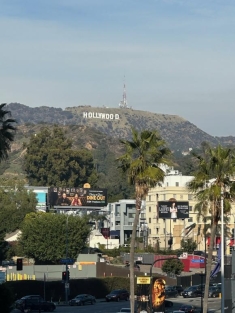Hollywood's Legal Secrets: Oscar Law Study Examines Entertainment Awards

On Sunday, the 2024 entertainment awards season will culminate with the live broadcast of the 2024 Academy Awards. Each year, millions of television viewers tune in to the Oscars, Grammys, Emmys, Tonys, and Golden Globes for a taste of Hollywood’s glitz and glamor. That global fascination is the subject of a new Rutgers study, which examines the cottage industry of entertainment awards and explains how the law plays a pivotal role in nearly every aspect of show business’s most glamorous microeconomy.
In “Oscar Law,” a law review article forthcoming in the Alabama Law Review, Reid Kress Weisbord, Distinguished Professor of Law and Judge Norma L. Shapiro Scholar, and Jordan Bondurant '24, publish the first comprehensive, descriptive account of law pertaining to the organization, production, and broadcast of major entertainment awards. Weisbord and Bondurant’s research unearthed a large sample of litigated cases, including disputes over the transferability of awards ceremony tickets, academy membership, award nomination eligibility, federal indecency and obscenity broadcast regulations, intellectual property rights protecting award statuettes and academy trademarks, and the organization of all major academies as tax-exempt nonprofit trade associations.
Along the way, Weisbord and Bondurant discovered colorful but long-forgotten anecdotes from the annals of show business. Examples include: the shocking 1989 decision by a California federal court holding that the Motion Picture Academy’s copyright in the Oscar statuette design had reverted to the public domain, a ruling later reversed on appeal; a $75 million lawsuit filed by the late borscht-belt comedian Jackie Mason against the Broadway League for disqualifying his one-man show from Tony nomination eligibility in 1994; and then-California governor Earl Warren’s brief stint as host of the 1951 Emmy Awards, just two years before commencing his storied tenure as Chief Justice of the United States Supreme Court.
Weisbord, a nationally recognized expert on the law of trusts and estates, is the author of a major treatise, a law school textbook, and more than 40 articles and essays about probate law and estate planning. For this project, however, Weisbord took a brief hiatus from weighty topics about property disposition at death. “This project explores the fun side of academic scholarship by subjecting a fascinating pop culture topic to the rigorous inquiry of legal research,” said Weisbord. “Jordan and I wrote this article with the goal of speaking to both legal and non-legal audiences,” he added.
Bondurant, who will graduate from the Law School in May, matriculated to Rutgers following a distinguished career as a professional actor in theater, television, and film. On Broadway, Bondurant’s stage credits include starring roles in the hit musical Mamma Mia! and the Tony Award-winning Best Musical A Gentleman’s Guide to Love and Murder. His television credits include Law and Order: SVU and The Good Fight. Bondurant holds a Masters of Fine Arts in Theater and spent both of his law school summers working for a prominent entertainment law firm in Manhattan.

Rutgers Law School provides students with opportunities to participate in faculty-supervised research for academic credit. “I initially invited Jordan to work with me as a research assistant, but his extraordinary creativity, dedication, analytical skill, and enthusiasm transformed this project into a collaboration deserving of co-authorship. I’m delighted that Jordan will graduate from Rutgers as a published legal scholar,” Weisbord said.
“Collaborating on research with Professor Weisbord has been one of the highlights of my legal education at Rutgers. This project allowed me to take a deep dive into a topic of great personal interest. I learned so much from individualized feedback on my research and real-time guidance every step of the way,” Bondurant said. “I am extremely proud of this article.”
“Oscar Law” has been accepted for publication in the Alabama Law Review. A prepublication manuscript is accessible on SSRN.